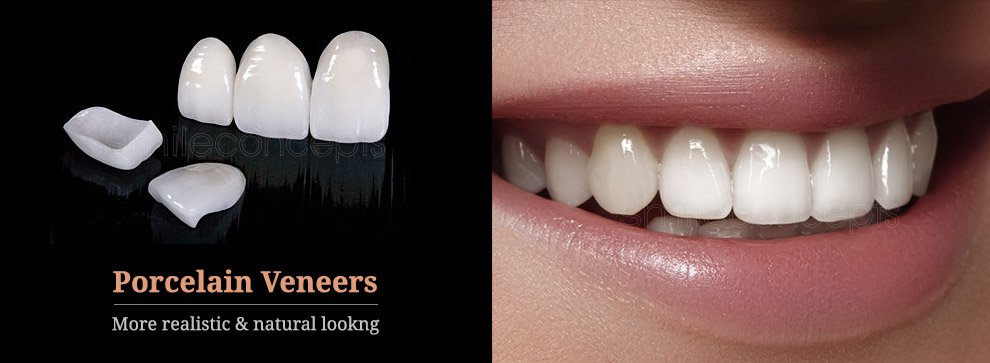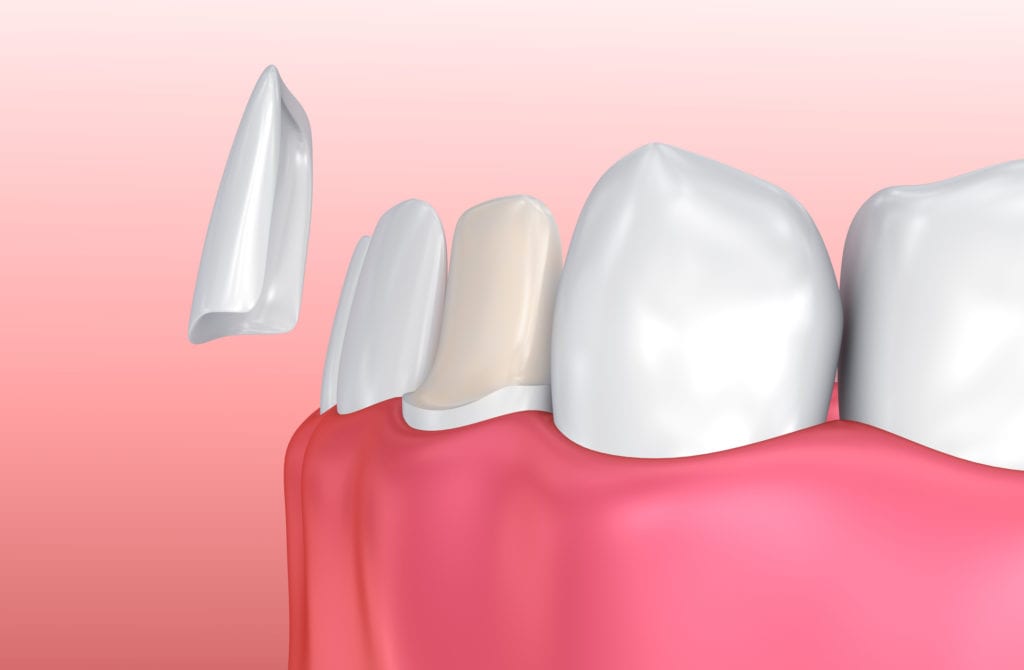Porcelain Veneers: Pros, Cons, and How They Compare to Composites
Unlocking the Keys of Veneers: Truths, Kinds, and Advantages for a Beautiful Smile
Veneers provide an engaging service for those seeking to enhance their smiles. These oral enhancements can attend to various blemishes, from staining to imbalance. With alternatives like porcelain and composite, individuals can choose based on their demands and choices. Nevertheless, understanding the subtleties of veneers, consisting of application and care, is important. What elements should one take into consideration before deciding? The responses might surprise those curious about this visual oral alternative.

Recognizing Veneers: What Are They?
Veneers are slim, personalized shells designed to cover the front surface area of teeth, boosting their appearance. Usually crafted from durable products, these coverings are tailored to fit each person's teeth precisely. They offer several purposes, including remedying visual imperfections such as staining, chips, or gaps. The application procedure includes a dental professional preparing the teeth, frequently by getting rid of a little amount of enamel to ensure a snug fit. Once prepared, the veneers are adhered to the teeth using a strong adhesive.
Individuals often select veneers for their capability to produce a natural-looking smile while providing a durable service to dental flaws. Unlike various other aesthetic dentistry options, veneers call for minimal intrusive procedures, making them a preferred option. The result is an improved smile that can substantially increase an individual's confidence and self-worth. In general, veneers supply an efficient method to accomplishing a much more attractive and harmonious oral look.
Kinds of Veneers: Porcelain vs. Composite
When thinking about aesthetic oral choices, 2 main types of veneers stick out: porcelain and compound. Porcelain veneers are crafted from a resilient ceramic material that imitates the all-natural appearance of teeth. They are known for their tarnish resistance and capacity to mirror light in a similar way to natural enamel, supplying a visual charm that numerous patients desire. The application procedure commonly includes more prep work of the tooth framework and may require numerous check outs to the dental expert.
On the various other hand, composite veneers are made from a tooth-colored resin that is straight used to the teeth. This kind enables for quicker application and can commonly be finished in a single browse through. While they are cheaper than porcelain veneers, they may not provide the same long life or resistance to staining. Inevitably, the choice between porcelain and composite veneers depends upon private preferences, budget, and certain oral needs.
The Advantages of Finding Veneers
Picking veneers provides numerous advantages that can significantly improve both the appearances and capability of a person's smile. Among the key benefits is their capability to fix blemishes such as staining, gaps, and imbalance, causing a much more uniform look. Veneers can also boost the resilience of teeth, providing a protective layer that guards them from damages.
In addition, they need minimal tooth preparation contrasted to other oral procedures, preserving more of the all-natural tooth framework. This preservation adds to a healthier oral atmosphere while still accomplishing a spectacular smile.
Veneers are extremely adjustable, permitting people to choose the form, dimension, and shade that finest suits their choices. In addition, they are stain-resistant, making it much easier to preserve a attractive and brilliant smile over time. Generally, veneers provide a reliable alternative for those looking for both aesthetic enhancement and long-term dental health benefits.
The Veneer Application Process
The veneer application process includes numerous crucial actions to guarantee suitable outcomes. At first, a consultation is performed to evaluate the client's demands, complied with by the preparation and shaping of the teeth. Ultimately, the veneers are bound in area, with adjustments created a best fit and look.
Preliminary Assessment Steps
A detailed preliminary appointment is vital for any individual thinking about veneers, as it sets the foundation for an effective therapy. During this conference, the oral specialist assesses the individual's dental health and wellness, reviewing any type of existing concerns that could influence the veneer application. This evaluation might include X-rays and a visual examination to identify the condition of the gums and teeth.
The dental practitioner additionally engages the person in a thorough conversation about their visual objectives, preferences, and expectations. They might provide different veneer options tailored to the client's certain demands. In addition, the expert explains the treatment, prospective threats, and aftercare demands, making sure that the client is comfy and knowledgeable before continuing with the treatment.
Prep Work and Forming Teeth
After the initial appointment, the following stage entails the preparation and shaping of the teeth to fit the veneers. This essential action is done by the dental expert, that thoroughly assesses the tooth framework to determine the amount of enamel that requires to be gotten rid of. Commonly, a slim layer, generally around 0.5 millimeters, is shaved off to ensure a proper suitable for the veneers. Accuracy is paramount during this process, as it impacts both the overall comfort and the visual result. When the teeth are appropriately shaped, impacts are required to create customized veneers that line up flawlessly with the client's oral account. This meticulous prep work sets the phase for a successful veneer application, enhancing both look and feature.
Bonding and Final Changes
Following the shaping and prep work of the teeth, the bonding procedure starts, marking an essential stage in the veneer application. Throughout this stage, an oral adhesive is applied to the ready tooth surface area, assuring a solid bond in between the tooth and the veneer. The dental professional thoroughly places the veneer, making adjustments to attain the preferred alignment and aesthetics. When properly positioned, an unique light is used to cure the sticky, solidifying the bond. After weblink curing, the dental expert performs last adjustments, cutting any kind of excess material and refining the veneer's form to ensure an all-natural look. This cautious focus to information boosts both feature and appearances, contributing to an overall stunning smile that is sturdy and durable.
Caring for Your Veneers: Upkeep Tips
Caring for veneers is crucial to maintain their look and durability. A consistent day-to-day cleansing regimen, conscious evasion of staining foods, and routine oral examinations are crucial elements of effective upkeep. These practices help assure that veneers stay in peak condition and remain to boost one's smile.
Daily Cleansing Routine
On a regular basis keeping veneers is important for their longevity and look. An appropriate everyday cleaning regimen can aid protect their sparkle and protect against damage. Dentists recommend cleaning twice a day with a soft-bristled tooth brush and fluoride tooth paste, guaranteeing that all surfaces are cleaned gently to prevent damaging the veneer surface. Flossing daily is likewise vital to get rid of food bits and plaque from in between teeth, where brushes might not get to. Furthermore, making use of an antimicrobial mouthwash can help preserve dental hygiene without harming the veneers. It is a good idea to avoid abrasive cleansers and devices that can scratch the veneer. By following these basic steps, individuals can maintain their veneers looking attractive while advertising total dental health.
Avoiding Discoloration Foods
Veneers are made to boost the look of teeth, their vulnerability to tarnishing demands careful dietary choices. It is crucial for people with veneers to be conscious of certain foods and beverages that can lead to staining. Dark-colored items such as coffee, red wine, and berry juices ought to be eaten in moderation, as they are known to discolor both all-natural teeth and veneers. Additionally, acidic foods like citrus fruits canister damage the bonding agents made use of in veneers, making them much more vulnerable to discoloration. To keep a bright smile, it is a good idea to rinse the mouth with water after taking in discoloration foods and to practice regular dental hygiene. These thoughtful selections add considerably to the longevity and aesthetic appeals of veneers.

Normal Dental Check-ups

Keeping the honesty of veneers calls for a dedication to routine dental check-ups, as these consultations play a necessary role in ensuring their longevity and look. Throughout these brows through, dental professionals can assess the condition of the veneers, looking for any kind of signs of wear, damage, or underlying dental issues. Furthermore, regular cleansings help eliminate plaque and tartar that find out this here can gather around the veneers, promoting overall oral wellness. Dental practitioners can likewise supply individualized suggestions on care methods and items suited for veneer upkeep. By adhering to a schedule of examinations, individuals can attend to potential troubles early, guaranteeing their smile remains beautiful and dynamic. Ultimately, routine oral visits are a critical element of veneer care.
Is Veneers the Right Option for You?
Deciding whether veneers are the right choice commonly rests on private oral demands and aesthetic objectives. For those looking for to attend to concerns such as staining, chips, or misalignment, veneers can provide a transformative option. Candidates typically include people with healthy and balanced teeth but want a boosted smile.
However, it is vital to take into account elements such as tooth enamel problem, the degree of dental problems, and the desire to preserve veneers - Veneers Teeth. Consulting with an oral expert is vital, as they can assess oral health and establish if veneers are suitable
In addition, prospective prospects need to reflect on the lasting commitment, as veneers might need substitute every 10-15 years. Price considerations also play a significant role, as veneers can be a substantial investment. Eventually, the decision must be well-informed, stabilizing visual desires with functional considerations for lasting outcomes.
Often Asked Questions
The Length Of Time Do Veneers Generally Last Prior To Requiring Replacement?
Veneers generally last in between 10 to 15 years before needing replacement. Factors such as dental hygiene, way of life options, and worldly quality can influence their long life, making normal dental check-ups vital for maintaining their condition.
Are Veneers Safe for People With Sensitive Teeth?
Veneers can be risk-free for individuals with delicate teeth, however it frequently relies on the seriousness of sensitivity and the dental professional's method. Consulting an oral expert before continuing is important to assure optimal outcomes.
Can Veneers Be Removed or Changed Conveniently?

Do Veneers Discoloration In Time, and Exactly How Can I Avoid It?
Veneers can tarnish over time, particularly from foods and drinks like coffee or merlot. To protect against discoloration, keeping good oral health, making use of a straw for beverages, and normal dental cleanings are recommended techniques.
What Is the Cost Array for Getting Veneers?
The expense of veneers typically ranges from $500 to $2,500 per tooth, depending upon factors such as product kind, dental expert experience, and location. Individuals need to talk to dental specialists for individualized quotes and funding options.
Once the teeth are effectively shaped, perceptions are taken to produce custom-made veneers that line up perfectly with the person's dental profile. During this stage, a dental adhesive is used to the prepared tooth surface, assuring a strong bond in between the veneer and the tooth. It is essential to take right into account elements such as tooth enamel problem, the level of oral problems, and the desire to preserve veneers. Veneers can be safe for people with delicate teeth, however it frequently depends on the severity of sensitivity and the dentist's method. The expense of veneers commonly varies from $500 to $2,500 per tooth, depending on variables such as material kind, dental expert experience, and place.